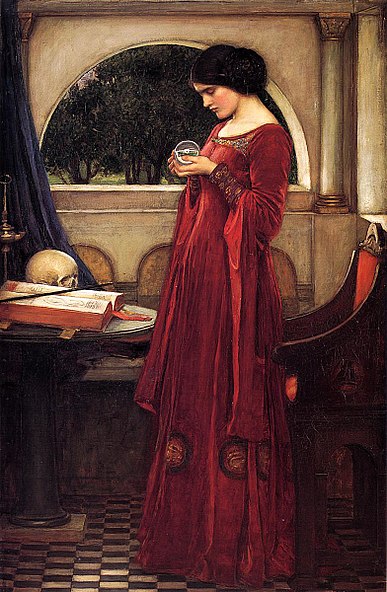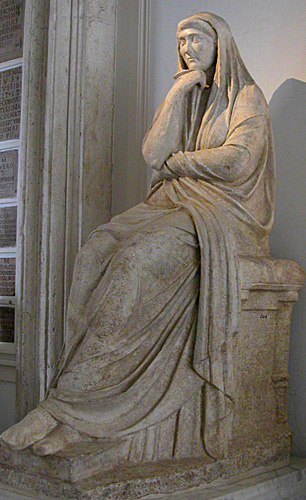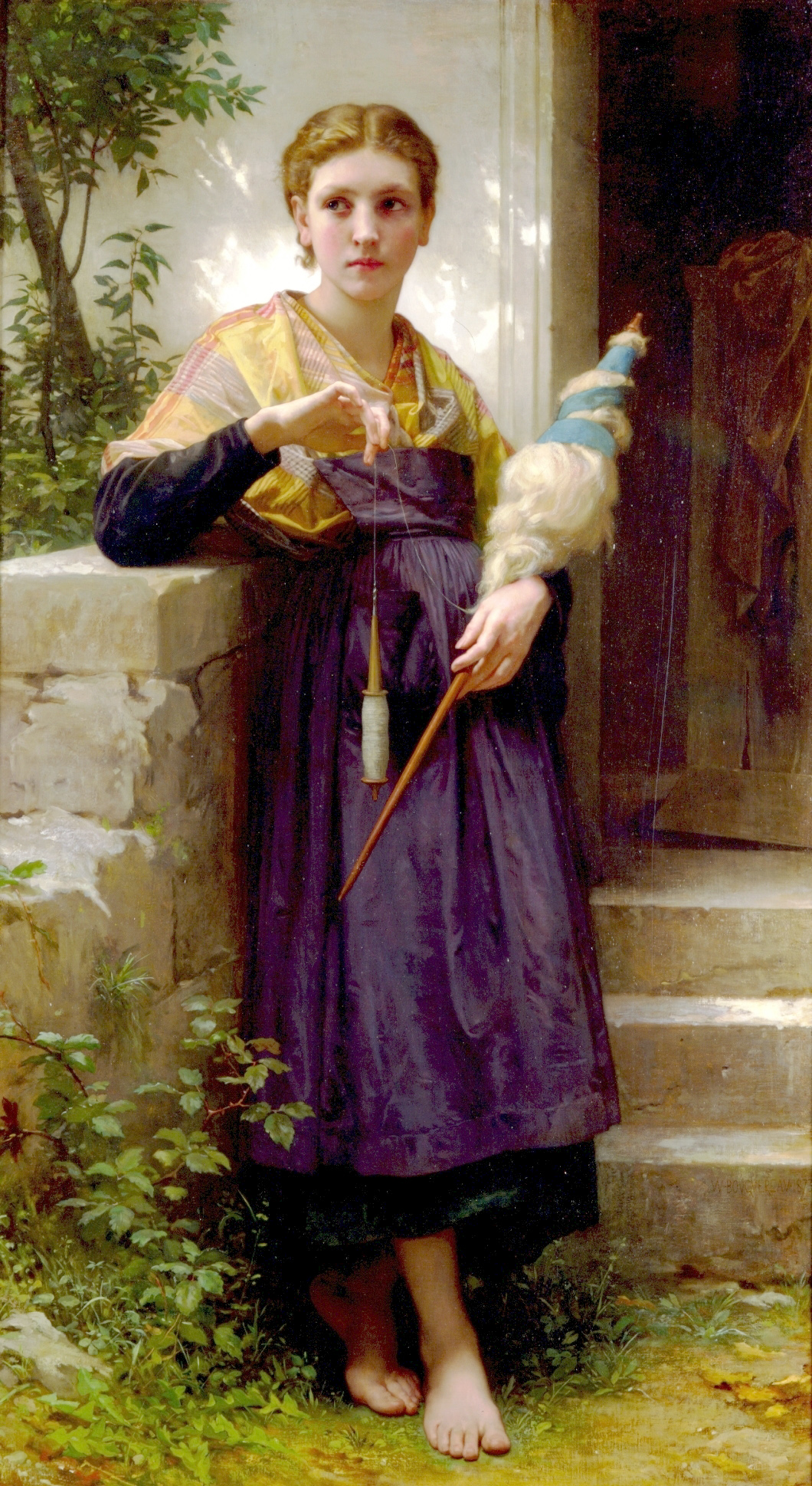Today, as I was in the midst of my suffering and struggles with my illness, the duties of being a stay at home mom, and the frustrations of physical ailments, I was suddenly struck by a most powerful vision. It shook me and while it did not relieve my suffering (if anything, it made it keener), I couldn't help the profound sense that this was at the heart of all the suffering in the world.
I was shown the Daughter in a dark place. She stood tall and proud, as graceful as a birch in early spring. Then a hand came out of the shadows and struck her. As She reeled to the side, another hand came out. Blows fell fast and from all directions. Her white body began to purple with bruises but still her faceless attackers continued to strike at her.
What started with hands soon began to include feet and clubs. The Daughter gradually began to kneel as the beating proved too much for her body to bear. Hands then dragged her to her feet by her hair, ripping some of it out as they did so. They cycled through this several times. So awful was that beating that she looked scarcely alive. Only the light in her eyes revealed that she continued to live when her body was so broken by the blows that she could not stand or shudder as her attackers continued to rain assault upon her.
She then locked eyes with some figure that I could not see and, with a sigh, expired.
Some ask why is there suffering in the world, I asked this myself earlier. This vision was the answer given to me. When we suffer, She suffers. When we are cruel to others, we join the Dark Queen's daughters in raining abuse upon Our Lady. Could she have defended herself from their blows? Perhaps, if she had been given a chance. Out numbered and unarmed, Our Lady was at their mercy, though mercy is a far cry from what she received.
It is difficult for me to find comfort in this vision. It moves me to sorrow and anger that she must suffer so. Such unjust torment, such torture, for being born and existing? It is a egregous wrong and I am moved to tears by it. Furthermore, I am moved to tears that my failures to be a compassionate and caring person, my actions that add to the suffering of others, not only causes suffering to others but add to the suffering of Our Lady.
I pray for forgiveness and mercy. For I know, the Daughter is ever merciful. When she arises and returns to the world, she does not bring a stern rebuke to those whose actions added to her suffering. She instead brings them compassion, understanding, and gentle correction. Rather then punish, she treats it as a 'teachable moment' and strives to bring those who err into correction through her grace.
Blurb
Thoughts, lessons, and theology from an eclectic witch from a varied background.
Tuesday, April 29, 2014
Sunday, April 20, 2014
Rosary Day and other musings.
| From Here |
In praying the Filianic rosary, the one engaged in this act meditates upon five mysteries, one for each decade. These mysteries are:
- The Mother as the fundamental 'ground' of all being - that which is truly Real and fundamental to all existence.
- The birth of the Daughter from the Mother.
- The death of the Daughter.
- The resurrection of the Daughter.
- The union of the soul with Dea.
- The Mother as the source of all existence.
- The birth of the Daughter from the Mother.
- The Daughter's taking on of her fate.
- The death of the Daughter.
- The resurrection of the Daughter.
- The Mother's creation of all existence.
- The first Maid's turning from Dea.
- The conception of the Daughter.
- The birth of the Daughter.
- The Daughter as Princess of the World.
- The Daughter as Priestess of the World.
- The Daughter taking on of her fate.
- The temptation of the Daughter.
- The ordeal of the Daughter's journey to Hel.
- The death of the Daughter.
- The Mother's grief of the Daughter's death.
- The resurrection of the Daughter.
- The miracle of the flowers.
- The exaultation of the Daughter.
- The union of the soul with Dea.

Some would think it odd that I would be so strongly inclined towards the rosary. I come from a family that is of Protestant Christian leanings and I was raised atheist/agnostic. It is something that one would think I would find awkward and difficult. It is, however, something that has come to me quite surprisingly with ease. I like to think that this is merely another sign that I am supposed to do this. The rosary comforts me and evokes a sense of peace that reminds me that Dea is with me in all things.
Three days ago, it was the minor feast of Maia's day. Maia is one of the angels of fate. She is the spinner of the threads that make up the fabric of reality as we know it. Maia could be considered by some to be an icon of Dea as the cosmic Mother. Happenstance resulted in my observing a fast from meat that day. I spent my day focused upon the sacred work of being a mother. (Because I truly believe that such work is holy.) When I wasn't busy at those tasks, I took time to work on my spinning and meditate upon Maia's role.
I do not think it was pure coincidence that Maia's day fell upon the day that is associated with Frigga. Frigga is a goddess of domestic things, along with a laundry list of other associations. A goddess of motherhood and spinning, I couldn't help but find parallels between her and Maia. It was something that continually returned to my mind as I was spinning out that terribly fine thread from blue merino wool and white angora bunny fur on the Turkish styled spindle that I had made myself.
It was something that resonated greatly with me. I still haven't managed to fully puzzle out the meaning of it. As I meditate upon this, something may occur to me or perhaps some synchronistic event will illuminate the deeper meanings that I am not noting right now. Right now, it is enough that I have made progress in integrating the sacred calendar of my Filianic faith into the secular calendar of my life. I expect that Dea will provide more for me to continue to make progress upon this path.
Sunday, April 13, 2014
No post this Tuesday.
Hello gentle Reader,
Due to the spring break, I will need to postpone this week's posting until next week. I apologize for the inconvenience and sincerely hope that this finds you all happy, healthy, and well. May you be blessed in all things.
Due to the spring break, I will need to postpone this week's posting until next week. I apologize for the inconvenience and sincerely hope that this finds you all happy, healthy, and well. May you be blessed in all things.
Tuesday, April 8, 2014
Light
| From Here |
I struggled with the question of what the nature of this Light was when Dea provided something of an example for me. I was struggling with my illness and feeling quite depressed a little while back. In that depth of despair, I found myself on the verge of giving up hope.
Then someone paused in their day to tell me how much I mattered to them. They explained that the fact that I made a point of listening to them when they were upset; that I tried to be cheerful and pleasant more often then not; and I do my best to make the world a better place then what it was when I first came through meant a lot to them. It was as though blinders were taken off of my eyes, suddenly, I understood what Light meant.
Light is love. Love is what gentles our tongues when frustration would make our words harsh. Love is what moves us to give our starving neighbor bread. Love is what prompts us to grow flowers in a place were others would think only weeds would prosper. I do the kind things that I do out of love for the world and other people. That love is but a pale reflection of the love that Dea has for us.
She pours out her love upon the world in a great and powerful river. The Daughter softens that river's flow so that we might not be swept away and turns it to a gentle rain that nourishes all life. The Daughter does this out of love as well, for she is a manifestation of Dea and Dea's love. The acts of Light (love) that we perform in this world are the drops of that gentle rain.
The more we do, the more of that gentle rain nourishes the parched world wherein we live. For the cracks of khear have robbed the world of that love just as they would allow water to run out of a jar. Let us work to pour more love into the world so that we might see Light here that reflects the Light of Dea.
Magic and Filianism.
 |
| From Here |
The transmission of the Holy Scriptures is said to have come from an ecstatic trance. I am inclined to believe that Dea provides us the ability to engage in magical study as a way we might come to learn more about the Real aspects of the world. The Holy Scriptures speak of the world as being illusory. Our efforts to comprehend the illusion are going to be fraught with frustration if we persist in focusing only upon what our five senses tell us.
Spells are no different from prayers. They are perhaps worded differently but they are still appeals to the Divine to bend the circumstances we find ourselves in to a shape more pleasing to us. Some would think that the audacity of humanity to ask such thing is madness. Yet, we ask such things daily.
The person who prays that their beloved family member be cured of cancer is asking just such a question. Their prayer is no different at its root then the person who is casting a spell for the cancer stricken person to be cured. The methods by which the request is made are different but the request is the same. Spells are simply prayers put to ritual actions.
One may ask what about divination. I would conclude that divination is favorable in the eyes of Dea as well. We are encouraged to look to the Janyati for aid in all things. Rare is the person to whom an angel would address directly. Divination, while at time a difficult tool, provides a flexible framework where we might discern their answers and aid. It allows us not only to become aware of the 'voice' of the spiritual world around us but for us to engage in deeper introspection.
When we turn look at the Temple of the Heart, verse one, we find:
Divination is a means by which we may come to know that which we would hide within our hearts and mind. Most people assume that divination is mere fortune telling. The term has its roots in the Latin term for soothsaying. Sooth is an ancient word for truth. Divination is a means of determining the truth of something. It may show us a pattern or perhaps the dancers who make up that pattern. That knowledge, when turned inward, reveals to us the depths of our hearts.Know your own heart and make examination thereof; for if you know not your own heart, there can be no true knowledge of anything.
There is no explicit prohibition against the practice of magic or divination. Indeed, there seems to be implicit encouragement to engage in these practices. As such, it is my fervent belief that we are to use divination and magic as tools in our efforts to know ourselves and draw closer to Dea.
Tuesday, April 1, 2014
Modesty in Action.
 |
| From Here |
This practice is part of a larger practice that calls for modesty in behavior. I considered this for a little while and wondered how it would manifest within today's world, as well as what actions one could take to fully engage the world while still remaining modest in this fashion. Some actions, such as wearing gloves when in public to prevent direct physical contact with unfamiliar people, are potentially archaic but still allow one to reserve their physical contact for those who are closest to them. Others, such as refraining from the use of vulgarity, are subtle acts of self restraint that allows one to keep to their prohibitions (or taboos, as some would call them) and yet move within the dominant society with out too many waves made.
It is difficult to balance the actions we are called to by our respective faiths and the actions that we are encourage to do by the world at large. The challenge of remaining modest is particularly keen for women. Society places incredible pressure upon women to dress and behave in sexually provocative fashions. Women who do not engage in this activity are viewed with some suspicion and at times mocked (the term spinster and the mockery of virgins are the first examples that come to mind). Modesty in behavior requires a considerable amount of strength in an environment that is hostile to such action.
One may wonder why a person would choose to limit themselves in such a fashion. It is important to recall that the purpose of modest behavior is twofold. First, it is an expression of respect and honor towards the belief system that calls upon the practitioner to engage in it. By acting in a modest fashion when your beliefs call you to do so, you show respect to your beliefs and actively engage in practicing what you proverbially preach. Secondly, modest behavior is an expression of self respect.
I discussed the concept of modesty in more detail in an earlier post. I would prefer to focus now on how one behaves modesty. It is a lifestyle choice that is at times subtle and difficult to discern. It is, in many ways, a counter-cultural activity and some could go so far as to frame it as a quiet form of civil disobedience in the light of cultural tides that flow.
A modest person is not boastful or vulgar. They strive to be correct in speech and deed. As such, they will refrain from casually swearing, excessively bragging about their accomplishments, or taking actions that draw undue attention to themselves. The modest person is the person in the crowd who is dressed in a fashion that is not sexually provocative or too flashy. Some may argue that the distinctive dress that marks some movements go against this but there are exceptions to every rule.
Generally, modesty tends to be dictated by the cultural mores that are predominant in a region. Persons coming to a modest perspective from an Arabic background will have a different approach to the topic as a person coming from an American background (like myself) or a person coming from a Continental European background. Filianist writers tend to promote a Western approach towards modesty due to the fact that the majority of the publicly known practitioners come from this cultural background. There is also evidence of a strong emphasis from Christian influences due to the fact that Christianity shaped a great deal of the cultural mores of Europe and related cultures.
Working from this basis, a picture of the modest Filianist begins to clarify. Their manner of dress tends towards more conservative fashions, often echoing an earlier era such as Victorian or the 1950s-1960s. Their behavior is focused upon the terms of propriety and correct social interactions for their dominant culture where in they are located. Generally, they refrain from vulgarity; give deference to their elders and persons of importance; and will be given to act with restraint. Modesty as a form of behavior has more forms of expression then modesty in dress, but in either case, there are similar standards at play.
Subscribe to:
Posts (Atom)

